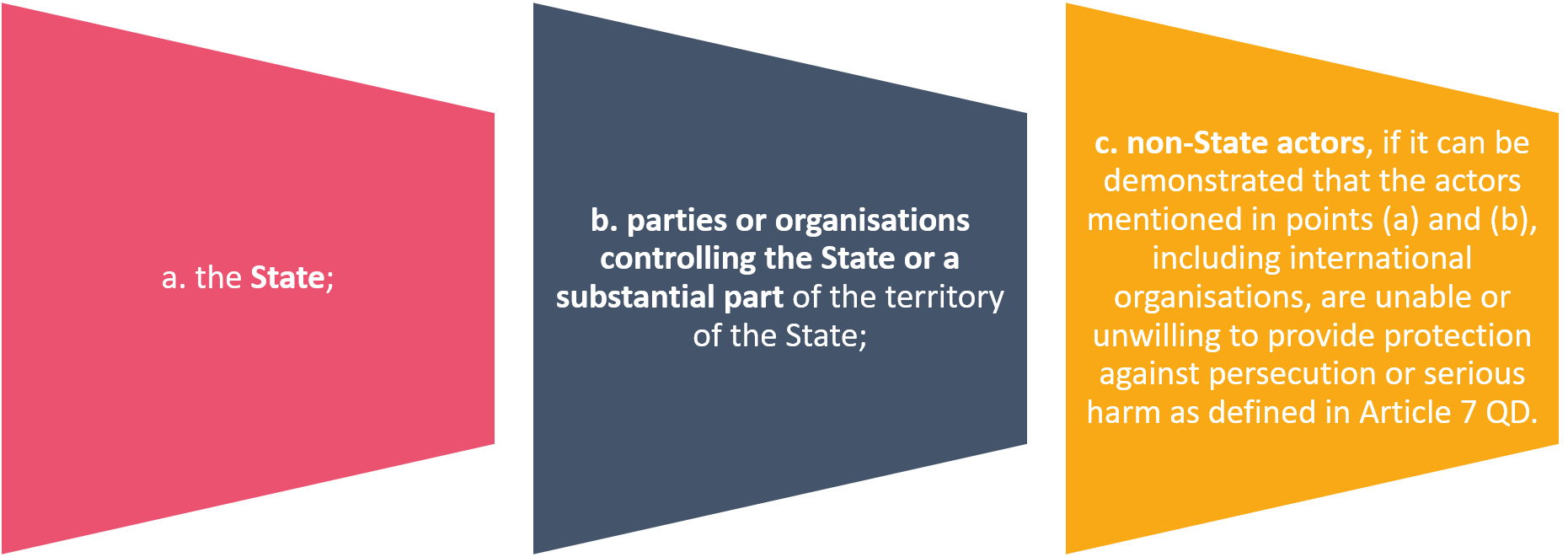Risks to which a population of a country or a section of the population is generally exposed do not normally create in themselves an individual threat which would qualify as serious harm (Recital 35 QD). Generally, persecution or serious harm must take the form of conduct on the part of a third party (Article 6 QD).
According to Article 6 QD, actors of persecution or serious harm include:

The following are the conclusions concerning some of the actors, as indicated in applications for international protection. It should be clarified that not all groups mentioned below are found to currently fall under the scope of Article 6 QD.
■ The Nigerian State authorities and affiliated actors, such as the Nigerian Armed Forces (NAF), the Civilian Joint Task Force (CJTF), the Nigeria Police Force (NPF) and the Islamic Police (hisbah), are accused of committing a wide range of human rights violations.
State authorities and state-affiliated groups in Nigeria may be considered actors of persecution or serious harm in specific situations.
■ Boko Haram is a Salafi-jihadist group fighting for the replacement of the secular Nigerian state with an Islamic one. It operates in the North East of Nigeria. In 2016, Boko Haram split in Jama’atu Ahlis Sunna Lidda’adati wal-Jihad (JAS) and the Islamic State - West Africa (ISIS-WA). JAS is characterised by the use of more violent methods and continues to perpetrate systematic attacks against both Muslims and Christians. ISIS-WA focuses its attacks on Christians and persons not abiding by Sharia law (‘infidels’) and criticises the targeting of common Muslims; it has led ‘less frequent but larger attacks’ against military targets.
Boko Haram, including the two groups JAS and ISIS-WA, is considered an actor of persecution or serious harm in the areas where it operates.
■ There are a number of militant groups operating in the Niger Delta area. Their members demand an improvement of the conditions in the region and protest against its environmental degradation due to oil exploitation. Currently, the most active group is the Niger Delta Avengers (NDA). Previously and specially in the period 2006-2009, the Movement for the Emancipation of the Niger Delta (MEND) was particularly active.
Although MEND and NDA have perpetrated violent acts, those usually involve targeting infrastructure and do not result in harm to individuals. Therefore, in the context of the Niger Delta, the armed groups would rarely be considered actors of persecution or serious harm.
■ In the South East of Nigeria there are several separatist groups, among which the two main groups currently are the Movement for the Actualization of the Sovereign State of Biafra (MASSOB) and the Indigenous People of Biafra (IPOB). Both organisations mostly engage in awareness-raising activities, marches, and other non-violent gatherings.
The activities of MASSOB and IPOB to-date do not involve acts of persecution or serious harm and, in general, they would not fall under the scope of Article 6 QD.
■ Among the non-State actors of persecution or serious harm, the herders and farmers participating in armed groups have become increasingly relevant. The origins of the conflict are rooted in the difficulties to access natural resources such as water and land. Nowadays, it also has profound ethnic and religious implications and is becoming more politicised.
In the context of the conflict between herders’ and farmers’ armed groups, both may be considered actors of persecution or serious harm.
■ Student cults in Nigeria, also referred to as ‘university cults’ or ‘confraternities’, resemble criminal gangs, with violent initiation rites and illegal activities such as: killings, human trafficking, drugs trafficking, smuggling, extortions, kidnapping, forced recruitment, etc. Some of the most well-known cults are the Black Axe and Eiye.
Student cults operate mainly in the southern states of Nigeria and may be considered actors of persecution or serious harm in specific situations.
■ Trafficking within Nigeria and to other countries, including in EU Member States, is a significant problem concerning applicants from Nigeria. The traffickers may use deception, such as false offers of jobs and promises of safe travel to destination countries, and manipulation through traditional beliefs (juju). In some circumstances, the victims’ families support and encourage the trafficking for economic reasons. The exploitation can take different forms, such as prostitution or other forms of sexual exploitation, forced labour, slavery, removal of organs, etc.
Traffickers and trafficking networks are considered actors of persecution or serious harm.
■ In specific situations, other non-State actors of persecution or serious harm may include the family (e.g. in the case of LGBT persons, child and forced marriage, FGM), FGM practitioners, criminal groups, mobs, etc.


